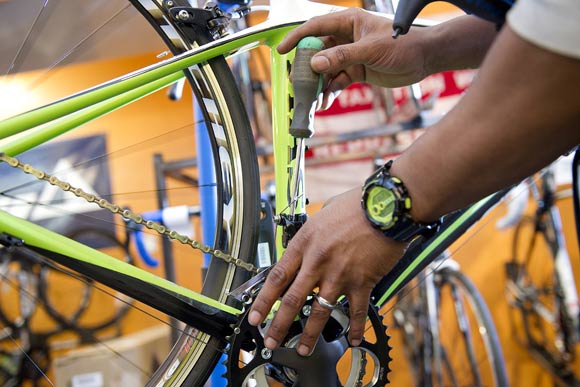The bicycling boom in the District is on a steady increase. D.C. is the number-three city for bike commuters, according to the U.S. Census bureau, the city added almost 50 miles of bike lanes from 2001 to 2010, and Capital Bikeshare is the second largest bikesharing system in the country. But while cyclists can be spotted throughout the entire city, a necessary amenity cannot be found for commuters east of the river.
There are no bike shops currently located in Wards 7 or 8.
“The city is driven by economics,” says Brian Ward, Sales Manager at Capitol Hill Bikes. “There may be a demand for bike shops in underserved communities, but those residents may not offer the finances to support them.”
With his shop located just one mile away from Anacostia—one of the city’s "bike shop deserts"—Ward has recently accepted an opportunity to involve Capitol Hill Bikes in a group formed to address the needs of his neighbors.
The Black Thumb Collective is a grassroots effort to provide free bike maintenance to commuters living in underserved communities. Formed of mechanics from partnering bike shops, as well as independent bike techs, the Collective will provide a necessary resource to keep residents in Wards 7 & 8 pedaling safely throughout the city.
The collective was created by Hamzat Sani, bike ambassador and East of the River Coordinator for the Washington Area Bicyclists Association (WABA).
In 2013, WABA’s East of the River Program partnered with The Bike House to produce nine mobile bike clinics, where volunteer and certified bike mechanics came to sites east of the river to provide free bike repair to residents. When Sani joined the WABA staff in August, he learned that the program would be ending due to exhausted grant funding for the project.
“The mobile bike shops became a really good way to engage with the community east of the river, so I started thinking of ways to continue that program and engaging with the community in a way that was meaningful to them,” says Sani. So he contacted six local bike shops, which agreed to allow mechanics a few hours of paid leave to service the community each month.
Borrowing from the “green thumb” label of veteran gardeners, he tagged the group “Black Thumb,” representing the aesthetics of greasy-handed bike techs.
Sani hopes that the collective will benefit bike shops by creating inroads into communities they would not otherwise see. Having a recurring presence in these communities will help to build shops’ brand recognition and potentially broaden their clientele.
“Cycling is changing on a daily basis,” says Sani. “What you think of as the Lance Armstrong, fully kitted with lycra and spandex cyclists are certainly still there, but more and more there are daily riders who hop on their bike or on bikeshare to grab groceries or get to work. Those are becoming more of the folk who are sustaining local bike shops.”
The Black Thumbs Collective is one of the first initiatives incorporating local bike shops to take a leadership role in addressing equity-based issues around cycling.

Late last year, Ward, the Capitol Hill Bikes manager, brought his head bike tech Brandon Lyles to the Anacostia Arts Center for WABA’s Cap City Bike Expo, the finale event for the 2013 East of the River program. The collective was made public for the first time and Lyles sat on a panel to discuss the role of bike shops in shaping bike-friendly communities citywide.
“The main concern was, how can we get something that is sustainable and convenient,” said Lyles, who has worked in bike maintenance for over a decade.
The Bike Expo also saw the installation of a new Dero Fixit stand, an outdoor self-service bike repair station outside of the Anacostia Arts Center. The tool allows riders to perform basic repairs and maintenance, from changing a flat to adjusting brakes and derailleurs.
“It’s the first in the city that is not tied to a bike shop,” says Sani.
Ernest Clark, head bike mechanic at City Bikes in Adams Morgan, volunteered at the Fixit stand during the expo, showing visitors how to utilize the tool to perform basic repairs.
“The best part was the warm reception of people from the community who need their bikes worked on,” said Clark.
As a member of the collective, Clark’s biggest hope is that it will lessen bike thefts in east-of-the-river neighborhoods.
“If we can help them to maintain their own bikes, they won’t feel like they have to steal bikes from others,” said Clark.
Sani also believes that the service can be used for crime prevention.
“Connecting the community to be able to walk and bike where they live changes the fabric of a neighborhood,” he said. “When you’re able to have more of a body presence, it tends to make the neighborhood a lot safer because crime happens in the shadows. So when people are constantly engaged, walking and biking in their communities, it will make crime that happens in the shadows a little harder in wards 7 & 8.”
Sani hopes to use the winter lull in the cycling season to assess the capacity of the collective, and then hit the streets this spring. Together, collective members seek to generate a newfound culture of community among local bike mechanics to do good work in deserving communities.